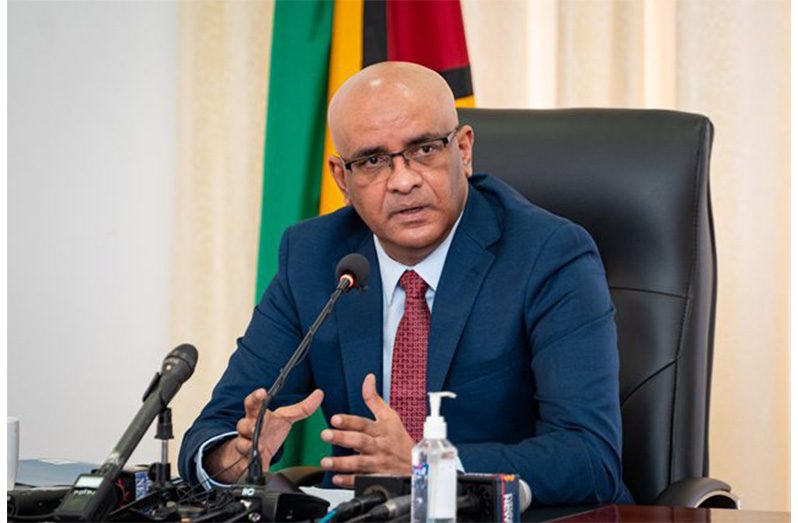DESCRIBING the government’s role as that of an “enabler”, Vice-President Dr. Bharrat Jagdeo has reaffirmed the administration’s commitment to creating an attractive regime designed to stimulate private sector investment across the energy sector while continuing to diversify Guyana’s economy.
The Vice-President made these remarks during a recent press conference at the Arthur Chung Conference Centre (ACCC), where he echoed sentiments made by President Dr. Irfaan Ali at the inaugural Georgetown Chamber of Commerce (GCCI) Energy Insights Breakfast, underscoring the government’s strategy of crafting policies and conditions that empower businesses.
He said, “When the President speaks, there are different audiences that he often addresses. He is selling a vision, and the government cannot do all of these things, because what the government is doing is creating an enabling regime for these things to happen.”
Speaking in detail about the government’s strategy to create an enabling regime, the VP noted that through co-investment, lower taxation, skill training and possibly infrastructure investment, the administration can then encourage the private sector to invest in these areas, because these very areas will generate sustainable income in the future.
Notwithstanding this strategy, the government continues to diversify the economy, and, according to the Vice President, this is through identifying new growth poles for the income and jobs of the future.

“So, we don’t want all of our eggs in the oil-and-gas basket,” he said.
According to Dr. Jagdeo, President Ali’s vision for data centres is ideal for tapping into a trend globally, where countries are competing now to have those in their country, particularly energy-rich countries, because it brings them significant advantages in the digital world.
“And so, we don’t want to be excluded here in Guyana. Who best to pick this up? It’s the private sector that has to run with these ideas. But he wants them to know that his government is receptive to supporting investments in these areas,” he explained.
Building domestic capacity and transparency
Similarly, Dr. Jagdeo discussed the President’s aim to build the capacity for local crude trading. Currently, Guyana markets its oil through a transparent tender system, awarding short-term contracts to pre-qualified international firms; a model that ensures accountability.
But the Vice-President said that a domestically managed trading arm could, in time, yield greater returns. Therefore, the government envisions developing the country’s domestic capacity to trade crude. But, as Dr. Jagdeo noted, it requires knowledge of the market.
“It’s not going to happen tomorrow, because we don’t have that capacity. But the private sector itself may be able to develop some capacity there. So maybe they can sell services to the government in this regard; technical expertise in that area,” he further explained.
The Vice-President stated that speeches such as the President’s are not in isolation.
“The government has a role as an enabler of investments, too, and that is what we’ve been pushing,” he stated.
Recently, Dr. Ali announced plans for Guyana to build its capacity in trading crude oil through strategic partnerships that will see the country boosting its expertise through knowledge and skills sharing.
“I will be working with the local private sector and international partners to ensure that we develop our capability and capacity in crude oil trading. We must be able to trade our crude oil from Guyana, with the infrastructure, with the human capital and with the market skills, and that is going to create enormous opportunities for us,” the President said.
These are the “bold decisions” and “bold ideas” necessary to transform Guyana’s future, the President said, highlighting the Vision 2030 initiative as a guiding framework for development across the country.
“We have to get those who have already done it for other countries to work with us in transforming the knowledge, maybe to enter a partnership for the next five years until we get the experience to do it on our own,” President Ali said.
He further underscored the important role the business community has to play, along with the government in ensuring that sustainable development and social equity are prioritised.
Back in October 2024, UK-based BB Energy Trading Limited and JE Energy secured contracts to market the country’s crude oil from its then three floating production storage and offloading (FPSO) vessels.
President Ali stressed the important role of the business community in propelling the country’s future, reminding many of the key players gathered of the critical role they play in the country’s transformation.
Last month, ExxonMobil Guyana started production at Yellowtail, the fourth oil development in Guyana’s offshore Stabroek block. Yellowtail’s One Guyana FPSO vessel joins the Destiny, Unity, and Prosperity FPSOs, bringing total installed capacity in Guyana to above 900,000 barrels of oil per day.
“Yellowtail’s ahead-of-schedule startup is a significant milestone for ExxonMobil and the people of Guyana,” said Dan Ammann, President of ExxonMobil Upstream Company. “With Guyanese making up more than 67 per cent of the country’s oil-and-gas workforce and over 2,000 local businesses engaged, this project reflects our deepening roots in the country and our shared commitment to long-term, inclusive growth,” he added.
The One Guyana is the largest FPSO on the Stabroek block to date, with an initial annual average production of 250,000 bopd and a storage capacity of two million barrels. Oil produced from the FPSO will be marketed as Golden Arrowhead crude.
By 2030, ExxonMobil Guyana expects to have a total production capacity of 1.7 million oil equivalent barrels per day from eight developments.
ExxonMobil Guyana’s deepwater developments are the most successful in the world. In five years, the company has started up four complex offshore mega-projects under budget and ahead of schedule, while simultaneously advancing plans for four additional projects by the end of the decade.



.jpg)








